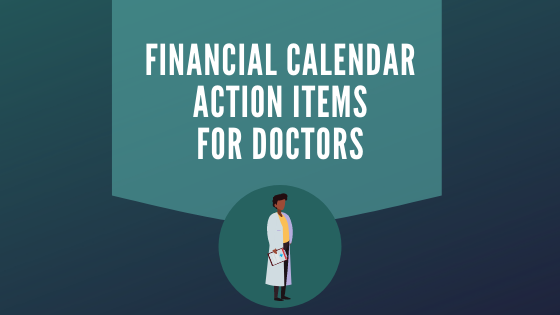
Planning for the entire year can be stressful. There are so many deadlines, events, and professional and personal priorities to keep up with, and when it comes to your financial goals missing key dates can be costly.
Many experts agree that you will have a better chance of reaching a goal or remembering something if you write it down or talk to someone about it. Spaugh Dameron Tenny is here to support and guide you in working towards your financial goals. Below are some financial planning items and timeframes that we think are important for physicians and dentists. Not all of them may apply to your situation, but we are available to talk through or answer questions about any of these that resonate with you.
Q1: January - March
Financial goals will vary for most based on where you are in your career and your financial priorities. Before you set any short or long-term goals, it is vital to understand the Pyramid of Financial Priorities. For example, suppose you haven’t established an appropriate emergency fund to cover unexpected expenses like replacing a failing water heater or major car repairs. In that case, you may want to hold off focusing on other financial objectives. Your financial advisor can help guide you as you determine what your financial priorities are.
Goal ideas: Creating an emergency fund is an essential first step in financial planning, and paying off high-interest debt is a solid follow up. Generally, for dentists and physicians, this type of debt is in the form of student loans and credit card debt.
Avoid tax-time worries by being prepared. When you receive your W-2s from your employer or 1099(s) and any interest and dividend statements, organize them in your tax prep file. Make sure you also add other essential information you will need, including paperwork related to student loans, property that your own, business ownership, records of charitable giving, and other receipts you’ll use when itemizing deductions.
Key Dates:
March 31: For Medicare enrollees, this is the final day to apply for Part A and B for coverage to begin in July.
Q2: APRIL – JUNE
If you have not yet done so, make sure to file your taxes by the drop-dead date of April 15. Even if you plan to ask for an extension to pay your taxes, the deadline is also April 15.
While spring is still in the air, it time to think about what your summer plans are. If you plan to go on vacation, stay put for a staycation, or the kids are out of school, it will be helpful to find time to budget for summer spending. Some of these expenses may include child care or day camp, travel, out of town guests, family gatherings, or even closing your practice while you and your team are away on vacation.
Does your student loan debt seem insurmountable? There are effective student loan strategies you can use to help you reduce your debt. A financial planner can help guide you through the student loan repayment process to ensure you pick the best repayment strategy for your big picture plan.
Learn more about Public Student Loan Forgiveness:
Did you know that physicians whose work qualifies as public service can be eligible for the Public Student Loan Forgiveness (PSLF) program? One’s employer almost always determines eligibility. Public service includes full-time employment by a 501(c) (3) tax-exempt nonprofit or public institution (which many hospitals are). It can also involve working in areas that are considered underserved or have a high need for qualified medical professionals.
If you work for a qualifying institution, you may want to explore if this is a good option for you. Borrowers are required to make 120 payments (monthly payments for 10 years) while doing PSLF-qualified work. They are also highly encouraged to complete and submit the PSLF form annually to help track their progress toward qualifying for PSLF. Regularly submitting the PSLF form should make it easier to apply for forgiveness once the requirements have been met.
Key Dates:
April 15: Last day you can make an IRA contribution that will apply to the previous year’s tax return.
June 15: Third quarter estimated tax payments are due for those that are self-employed and others who do not pay enough through paycheck withholding.
June 30: Final date to file a free application for Federal Student Aid (FAFSA) form the 2021-2022 school year. Many states and universities may have their own deadlines; review yours on the Federal Student Aid website.
Q3: JULY – SEPTEMBER
Midyear is a good time to review your budget. Check in to see if you are hitting your spending and savings goals. If you are not, what do you need to adjust before the end of the year to stay on track? Having a financial planner can make staying on track more manageable as they can provide guidance on options that will help meet your financial goals.
It is easy to buy life and disability income insurance and then forget about it. The decision to purchase these types of insurance is often made out of confusion or fear when it should be contemplated and done with intent. Take time annually to review the coverage you purchased to ensure it is adequate and reflects your current need and family status. Your financial advisor should be able to help answer questions about your insurance coverage needs.
Learn more about Whole vs. Term Life Insurance for White Coats here
Learn more about What Doctors Should Know about Disability Income Insurance here
Estate planning is a crucial aspect of retirement planning, especially for physicians and dentists who want to leave a legacy and save as much heartache as possible for their loved ones. Those in the healthcare field know the importance of setting up a living will (or health care directive). You will want to review all your estate planning document to ensure your beneficiaries are up to date, as well as make sure any changes to your plans are updated.
Key Dates:
September 15: Third quarter estimated tax payments are due for those that are self-employed and others who do not pay enough through paycheck withholding.
Q4: OCTOBER – DECEMBER
Don’t wait until you are busy with the winter holidays to financially prepare for the year’s end. The last quarter of the year is generally a smart time to review your financial plan and do some end of year financial housekeeping. A financial planner can help you understand if you are meeting your financial goals for the year and advise on strategies to help you stay or get back on track as the year winds down.
Commonly, the fourth quarter is open enrollment time at your workplace, when you can enroll in or make changes to your benefits plan through your employer. As with most financial topics, there is no single recommendation that will meet the needs of everyone. It would help if you also thought about spending down any funds that don’t roll over like your Flexible Spending Account. Reviewing your options and determining your insurance coverage needs with your financial advisor's help is an excellent place to start.
If you don’t already have a charitable giving plan in place, you still have time to make donations that align with your values and that are tax-efficient. Once you identify the nonprofits that you want to support, work with your financial advisor to determine the best type of charitable contributions for your situation, especially if you plan to itemize your deductions.
Key Dates:
October 15: It’s Tax Day for those who received an extension on their taxes.
November 1 – December 15: Benefits election period for most places in the United States.
December 31: Last day to donate to the 501(c)(3) of your choice to have an effect on tax filing for the following April.
Many of the items or goals on your 2021 Financial Calendar can feel overwhelming or confusing. At Spaugh Dameron Tenny, your financial advisor can guide you through your situation to help you make the best decision for you and your family. There are a variety of choices, but you do not have to do it on your own. Schedule a complimentary discovery call when one of our financial professionals to start the conversation today!
CRN202301-276517

Jordan Bilodeau, CFP®, CEPA, is the Director of Planning & Strategy at Spaugh Dameron Tenny, where he leads firmwide planning initiatives and helps clients navigate complex financial decisions. With experience in portfolio design, tax strategies, and business succession planning, Jordan works with executives, physicians, dentists, and successful retirees to coordinate every aspect of their financial lives. He holds both the CERTIFIED FINANCIAL PLANNER® and Certified Exit Planning Advisor designations and has a Master’s degree in Wealth and Trust Management, providing tailored guidance for clients.
Finance has a reputation for being complicated, and not without reason. Like many specialized fields, it comes with its own language, acronyms, and ...
Read More →If I had a dollar for every time a new client made one of the comments below, I’d have … well, a lot more dollars.
Read More →At Spaugh Dameron Tenny, part of our role is helping clients start each year grounded in facts, not headlines, assumptions, or half-answers. When ...
Read More →